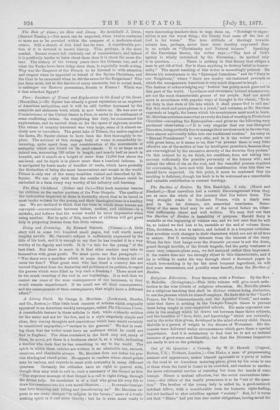A Living Faith. By George S. Merriam. (Lockwood, Brooks, and
Co., Boston.)—This little book consists of articles which originally appeared in an American weekly newspaper, called The Christian Union. A remarkable feature in those articles is that, while evidently written for the many and not for the few, and in a style singularly simple and clear, they convey thoughts and convictions which here would certainly be considered unpopular,—" caviare to the general." We feel in read- ing them that the writer must have an audience which he could not find in England. The ideas contained in the book may not, many of them, be novel, yet there is a freshness about it, as a whole, indicating a teacher who feels that he has something to say to the world. The spirit in which these articles are written is an admirable one, earnest, cautious, and charitable always. Mr. Merriam does not define his pre- cise theological stand-point. He appeals to readers whose stand-points may be various, and expects to meet with sympathy in many different
quarters. Certainly the orthodox have no right to quarrel with, though they may wish to add to, such a summary of the Gospel as this. "The supreme message of that Gospel is a call to right living, through the divine help. Its revelation is of a God who gives his very life to
draw his creatures into his own moral likeness It reveals Omnipo- tent love inspiring and lifting and transforming us." Mr. Merriam ex- pects to see many changes "in religion in the future ;" more of e truth- seeking spirit in it and more charity : but he is even more ready to
warn innovating teachers than to urge them on. "Bondage to super- stition is not the worst thing ; the liberty that casts off the law of God is far worse." The true attitude of theology towards science has, perhaps, never been more forcibly expressed than in an article on " Christianity and Natural Science." Speaking of the Darwinian theory, the writer says The fact of God's agency is wholly untouched by the discussion ; its method only is in question There is nothing in that theory that obliges a man to got rid of God Nor is there anything to destroy belief in immor-
tality." The moral teaching of this writer is exceedingly pointed. He direete his countrymen to the " Episcopal Catechism " and its 4, Duty to our Neighbour," where " there are sundry old-fashioned precepts at
which the unregenerate American is very much disposed to laugh The fashion of acknowledging any betters' has pretty much gone out in this part of the world. Lowliness and reverence,' toward whomsoever, are not the most characteristic graces of our people. And not much more in accordance with popular ways of thought is the clause, To do my duty in that state of life into which it shall please God to call me.' But this staid and quiet phrase is a jewel," and contains, as Mr. Merriam expounds at length, the lesson which his countrymen most need to learn. Mr. Merriam criticises somewhat severely the form of worship in Protestant Churches—excepting the Episcopalian—and gives us the following very pertinent observation :—" It is very singular that our non-liturgical Churehea, being perf octly free to manage their services each in its own way, have almost universally fallen into one traditional routine." An essay on "Eternal Punishment" is very able, and in it the writer points out with great force, as it seems to us, that "at present there is very little effective use of the motive of fear by intelligent preachers, because they are overweighted by the excessive severity of the doctrine they profess." On this subject he is, we think, too confident, from not taking into account sufficiently the possible perversity of the human will ; and indeed the effect of sia on the soul, and the remedial process required for overcoming it, have met with less consideration from him than we should have expected. On this point, it must ho confessed that his teaching is deficient, though his book is to be welcomed as a remarkable and valuable contribution to current theology.






























 Previous page
Previous page